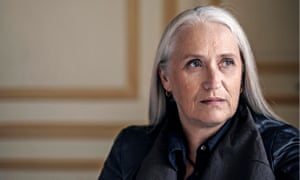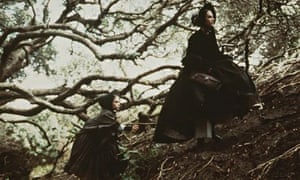
Jane Campion: ‘Life isn’t a career’
by Andrew Pulver for The Guardian
Monday 12 May 2014 06.59 BST
Last modified on Saturday 21 June 2014 02.00 BST

Jane Campion. Photograph: Jean-Francois Robert
After becoming the first female Palme d’Or winner, Jane Campion looked ready to usher in a new era of feminist cinema – but tragedy intervened. As she returns to chair Cannes, she tells Andrew Pulver about surviving as a woman director
Jane Campion was the first woman to win a Palme d’Or and only the second ever to be nominated for the best director Oscar. So it comes as a surprise that her latest gig, as president of the Cannes film festival jury, isn’t another act of pioneering gender breakthrough. She’s actually the 10th woman to lead the festival’s prize-giving committee – even if men have done it on 57 other occasions – and shares the honour with some heady company: Jeanne Moreau, Françoise Sagan, Liv Ullmann, Sophia Loren. But as the only female winner, to date, of that top prize, it’s the kind of honour that is her due.
As the festival gears up for its 67th edition, Campion appears stoical about what she calls an “experiment in socialism”, the shepherding of an eight-strong group – including fellow directors Sofia Coppola and Nicolas Winding Refn – around the Cannes competition films. “My job is to make sure everyone’s voice gets heard. They are all investing two weeks of their time to come and watch the films and think about them. But I will also be trying not to let things get personal, and keep a sense of humour. It’s a matter of looking after people – I think women do that really well.”
Perhaps inevitably, considering her figurehead status, Campion’s thoughts often turn to what women can and can’t do in the film industry. She won’t knock the festival itself, despite its habit of routinely granting high-profile berths to a coterie of veteran male directors; Cannes has, as she says, “been really kind” to her, screening her early shorts (one, Peel, won the short film Palme d’Or in 1986) and taking her first feature, Sweetie, three years later, before giving her the ultimate accolade for The Piano in 1993 (shared with Chen Kaige’s Farewell My Concubine).
Even so, she recalls with some horror an event she attended for Cannes’ 50th anniversary, when she found herself on a stage with all the other Palme d’Or winners – the only woman there. “It was a shocking moment. It was embarrassing for everyone. I think everyone felt that it was really not right.” She still would be the only woman, but the festival is emphatically not the problem. “My sense is that Cannes is very interested in new voices in cinema, never mind where it comes from or the sex of it. It’s to do with who funds films in the first place.”
“At film schools,” she says, “the gender balance is about 50/50. Women do really well in short-film competitions. It’s when business and commerce and art come together; somehow men trust men more.”
What’s to be done? “My feeling is we need an Abraham Lincoln figure to get in there, and say – especially when it comes to public money – it has to be equal.” Citing the state-funding system in Australia and New Zealand in the 70s, she says: “We are 50% of the population. That’s a good point and [state funding] is where you can push really hard and say something’s wrong here, we want change.” Conversely, though, Campion is wary of the danger of concentrating too hard on ideology. “When I talk to young women film-makers, I say: don’t think about this too much. Being a director is very tough, and you need everything you’ve got just to do your best job. You doing a brilliant job is your best support. Just get on with it.
“Film-making is not about whether you’re a man or a woman; it’s about sensitivity and hard work and really loving what you do. But women are going to tell different stories – there would be many more stories in the world if women were making more films.”

Anna Paquin and Holly Hunter in The Piano PR
It was Campion’s feature The Piano – her second, if you discount the originally-made-for-TV An Angel at My Table – that appeared to galvanise the sense that a new kind of feminist cinema was possible, a properly entertaining one with widespread appeal, liberated from the dreary politicised ghetto of agit-prop film society or angry tub-thumping festival screening. If the Ridley Scott-directed Thelma and Louise blazed a mainstream trail in 1991 for a femme-buddy movie, The Piano went one further: its all-female creative leadership (Campion, plus longtime collaborator Jan Chapman) and defiantly feminised, literary-inflected themes won both critical acclaim (including three Oscars, best actress for Holly Hunter, best supporting for 11-year-old Anna Paquin, and best script for Campion) and serious box office. The story of repressed Victorian settlers in New Zealand, among them a mute woman who trades sexual favours with a European man half-submerged in Maori culture in order to get her beloved piano back, The Piano appeared to be a harbinger of change.
As history tells us, it didn’t work out like that. The 1990s were dominated not by sophisticated studies of female sexuality, but by ironic heist films and pop culture-referencing slasher movies. Facile self-consciousness rather than heartfelt sensitivity won the day: Quentin Tarantino took over the shop, rather than Campion. Her follow-up to The Piano, an adaptation of Henry James’s The Portrait of a Lady with Nicole Kidman and John Malkovich, was respected rather than liked, and with each subsequent release – Holy Smoke, In the Cut – Campion looked to be floundering in a cinematic universe that failed to live up to her expectations.
Looking back from her 2014 vantage point, Campion is phlegmatic about her post-Piano difficulties. “I really loved Portrait, even if it didn’t satisfy people’s expectations about what I should be doing. It’s complex, because life isn’t a career. At exactly the same time that I won the Palme d’Or I had a baby that died, so the full impact of my success never hit me. I was grieving, really, throughout that whole year. It was a very difficult period, but at the same time it also protected me from any overblown thoughts. I was just struggling to exist.”
Campion is referring to her son, Jasper, who died when he was only 12 days old, shortly after The Piano won at Cannes. (She later gave birth to a daughter, Alice – now the actor Alice Englert, who was so impressive in the Sally Potter-directed Ginger & Rosa.) One can intuit the pain lingered for many years; in the early 2000s, she says, she “took a few years off to rethink how I wanted to do things and to bring up my daughter”. Her return to film-making was auspicious with the Keats biopic Bright Star – a “rebirth”, as she herself says. Her new approach was influenced, a little improbably, by French minimalist Robert Bresson of A Man Escaped and Diary of a Country Priest, and first showcased in a short film she made with her daughter in 2006 called The Water Diary, a segment of a campaigning feature film called 8. “It may not be obvious, but it was all about going back to simplicity. Bright Star hardly has a moving camera in it.”
Buoyed even further by the success of her TV series Top of the Lake, featuring Hunter with a very Campionesque wall of long, iron-grey hair, this much-missed director is now firmly back in the game. (She admits to being on the verge of closing a deal to shoot an adaptation of Rachel Kushner’s underground art scene novel The Flamethrowers for indie super-producer Scott Rudin.) Now over two decades old, The Piano is also enjoying a brief flurry of attention and critical care, with a restored print and Blu-ray release on the way. And it’s possible to sense that, with feminism in the cultural ether once again, the film might find its proper place in the pantheon.
“I didn’t plan it,” says Campion, “but I see it even more in those terms now than at the time. Back then, it was a cipher for some of my own frustrations about having a voice, and not being seen or heard. But the way women love women is different to the way men love women: women love women who feel real, who are complicated, and not just sex objects. The woman characters in The Piano are created by a woman; Ada was my heroine. That’s the reason it had the impact it did.”
• The Piano was released on Blu-Ray on 19 May 2015.



